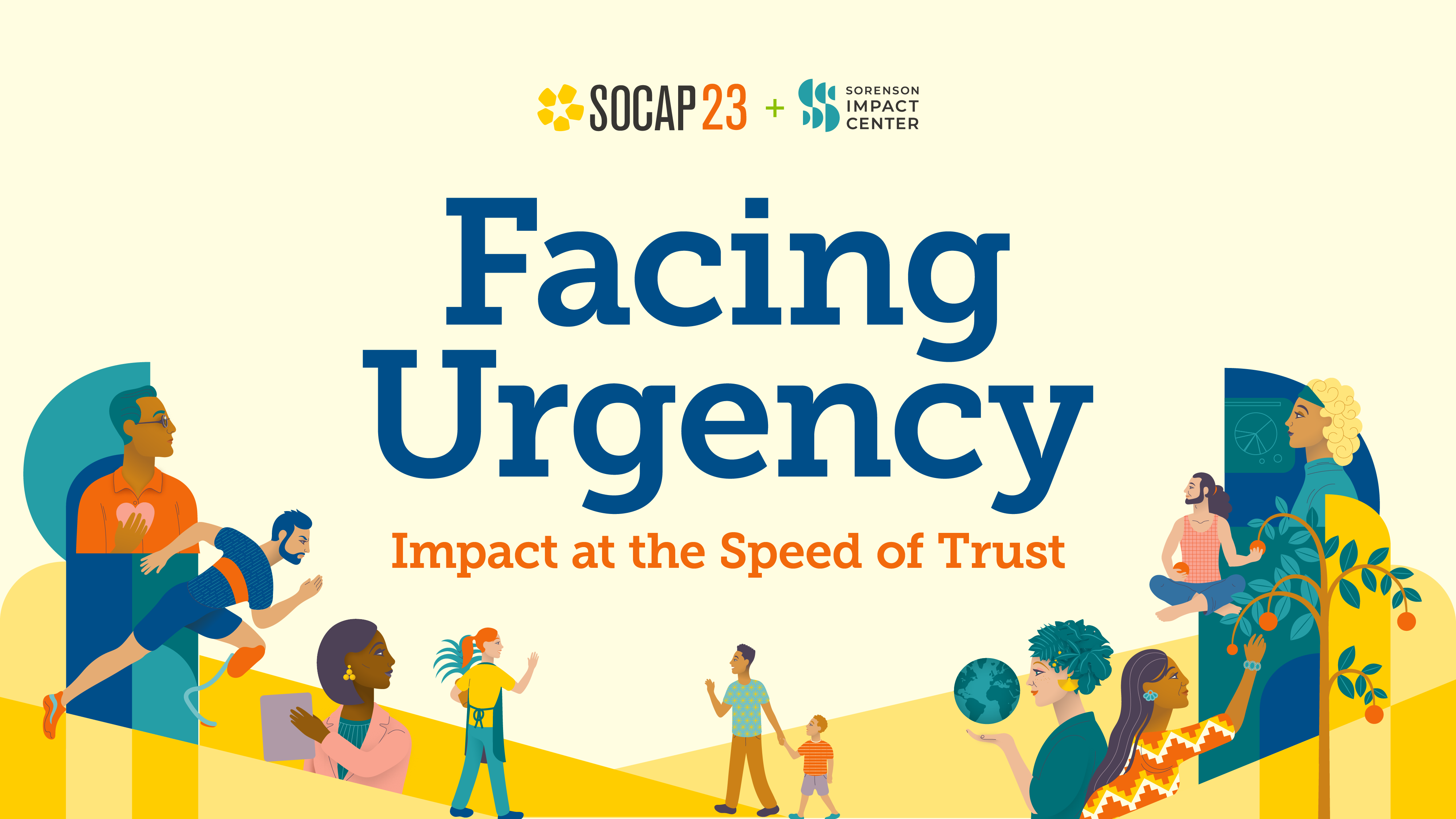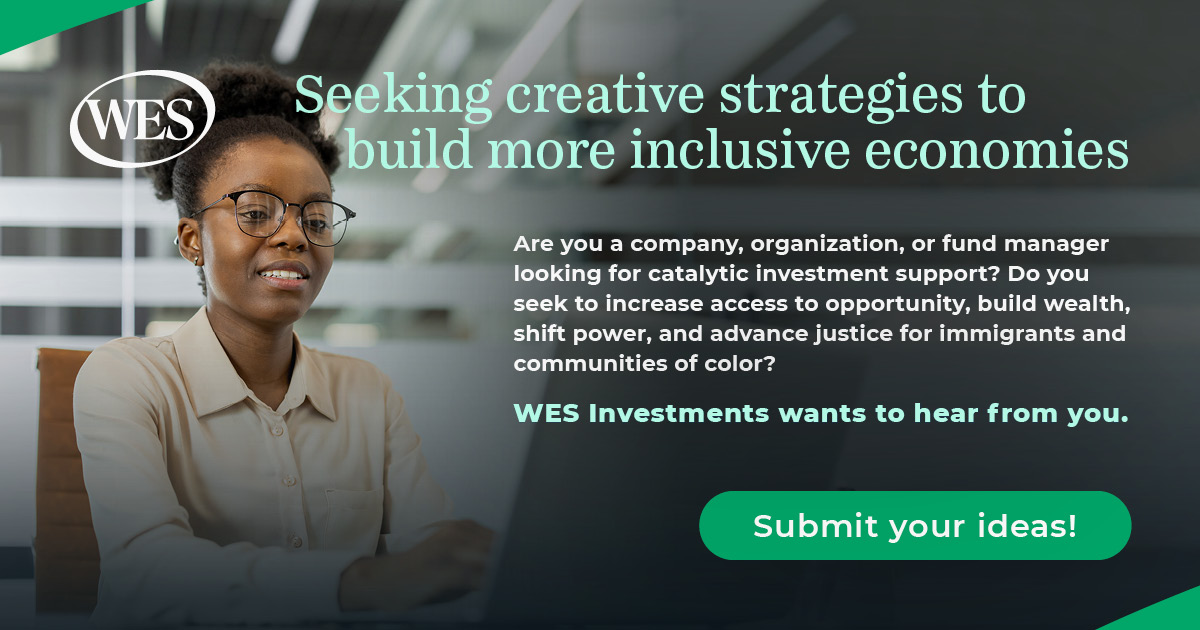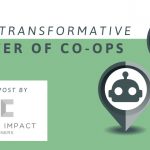SOCAP23 — Facing Urgency: Impact at the Speed of Trust
We are at one of the most exciting times of the SOCAP calendar: The time of year when our full team, content, and speakers begin to take shape and ramp up into higher gear. In determining the SOCAP23 theme, we aim to strike a balance where urgent action is rooted in trust and inclusive decision-making. We move with intention and with each other by facing urgency and creating impact at the speed of trust.
Our collaborative design process resulted in the important announcements we’re sharing below. We are so honored to be building this event with and for this incredible community.
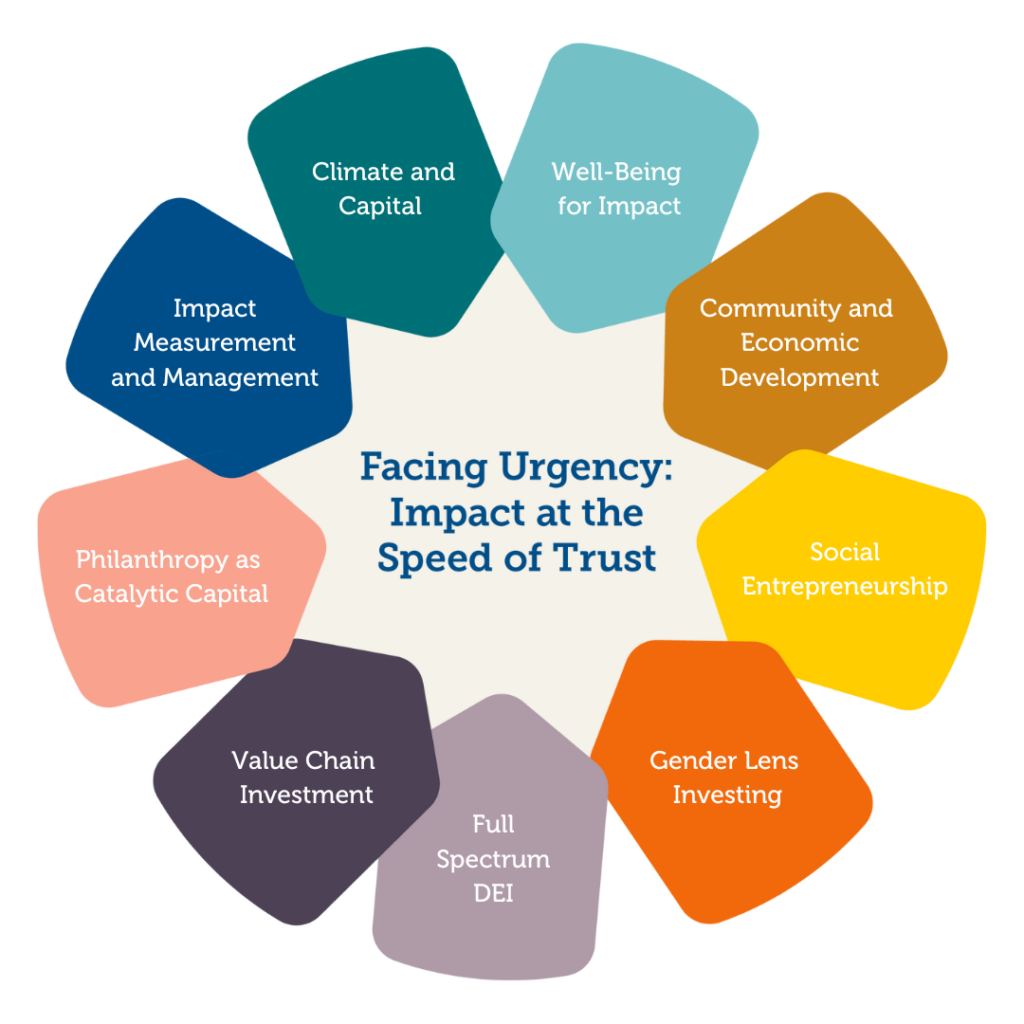
SOCAP23 Theme and Tracks
Why SOCAP and why now? We believe the answer is that there is a sense of urgency and need for action facing our world today, necessitating global collaboration — but work done in silos won’t get us far enough. We must build deep relationships more quickly to collaborate more effectively on the solutions we all seek to challenges around the globe.
The challenges of our time must be faced with urgent action and solutions. Trust is essential for catalyzing impactful solutions — when people trust each other, they are more likely to collaborate, share information, and take risks. When you build trust, you create a foundation for collaboration and cooperation. This leads to more innovative and effective solutions.
At SOCAP, we convene to accelerate the speed of trust. We orchestrate discovery, facilitate serendipity, and offer a platform for cross-learning. The SOCAP23 theme propels our community to work together, collaborate, and co-create as essential ingredients to rapidly create real impact.
Within our theme, we have identified the nine content tracks around which we will organize our sessions:
- Climate and Capital: Delve into the disproportionate impacts of climate change on marginalized communities and the need to mobilize capital toward equitable solutions.
- Philanthropy as Catalytic Capital: Explore innovations in philanthropy with a focus on the role of blended finance in mobilizing private capital for sustainable development projects that might otherwise be too risky or expensive for private investors.
- Impact Measurement and Management: Discover the latest insights on managing and analyzing impact and ESG (environmental, social, and governance) data measurement and how it can help to demonstrate the value of social and environmental investments and be used to drive decisions for more sustainable and equitable outcomes.
- Gender Lens Investing: Examine the strategies or approaches to investing that take into consideration gender-based factors across the investment process to advance gender equality and better inform investment decisions.
- Full Spectrum DEI: Explore the critical role of diversity, equity, and inclusion (DEI) in impact investing in order to create a more just and equitable world through reaching and expanding investment opportunities and outcomes. Conversations will include topics of race, gender, sexuality, ability, and more.
- Community and Economic Development: Delve into innovative approaches and practical strategies for mobilizing capital to create sustainable and inclusive economic growth and gain a deeper understanding of the challenges and opportunities facing communities today.
- Well-Being for Impact: Explore well-being as a central element of developing and supporting impact leaders that are more empathetic, resilient, collaborative, and creative, who can, therefore, be change agents who are also more effective in their roles and create a more positive and productive work environment.
- Value Chain Investment: Discuss the intersection of value-chain and impact investing to minimize environmental degradation and benefit communities while addressing global issues, such as human rights, agriculture and food production, and fair labor practices.
- Social Entrepreneurship: Dive into how to create positive change through innovative business models and sustainable solutions, including impact investing, sustainable development, social innovation, and more, to impart a deeper understanding of the role of social entrepreneurship in advancing social and environmental sustainability and practical strategies for creating and scaling successful social ventures.
We will also have regional tracks for attendees to follow, focusing on:
- Latin America
- Africa
- Asia
Learn more about the descriptions and session plans for each of the tracks within the SOCAP23 theme!
SOCAP23 Content Team and Content Curation Councils
At SOCAP, we are committed to transparency in our content selection process. We believe that by providing our audience with the information they need to understand how the selection process works, we ensure that content at SOCAP remains relevant, strong, and vibrant.
This year, we have evolved our curation process, moving toward a distributed approach to building our conference programming. The SOCAP content team, led by Executive Director of Strategy & Content Michelle Arevalo-Carpenter, has expanded this year. We have welcomed Senior Content Director Chris Ategeka, Senior Content Manager Elena Crescia, and Content Manager Nicole Lasasso.
In addition to SOCAP Open sessions, the sessions within each content track for SOCAP23 will be co-created with and curated by Content Curation Councils of more than 36 experts from around the world working closely with our content and production teams. The content team and Content Curation Councils are tasked with identifying the set of sessions that will guide the conference conversations along each track. Each track and each session is the result of a months-long process designed to present a SOCAP23 experience that helps our community accelerate relationships, break down silos, and identify gaps — then bridge them.
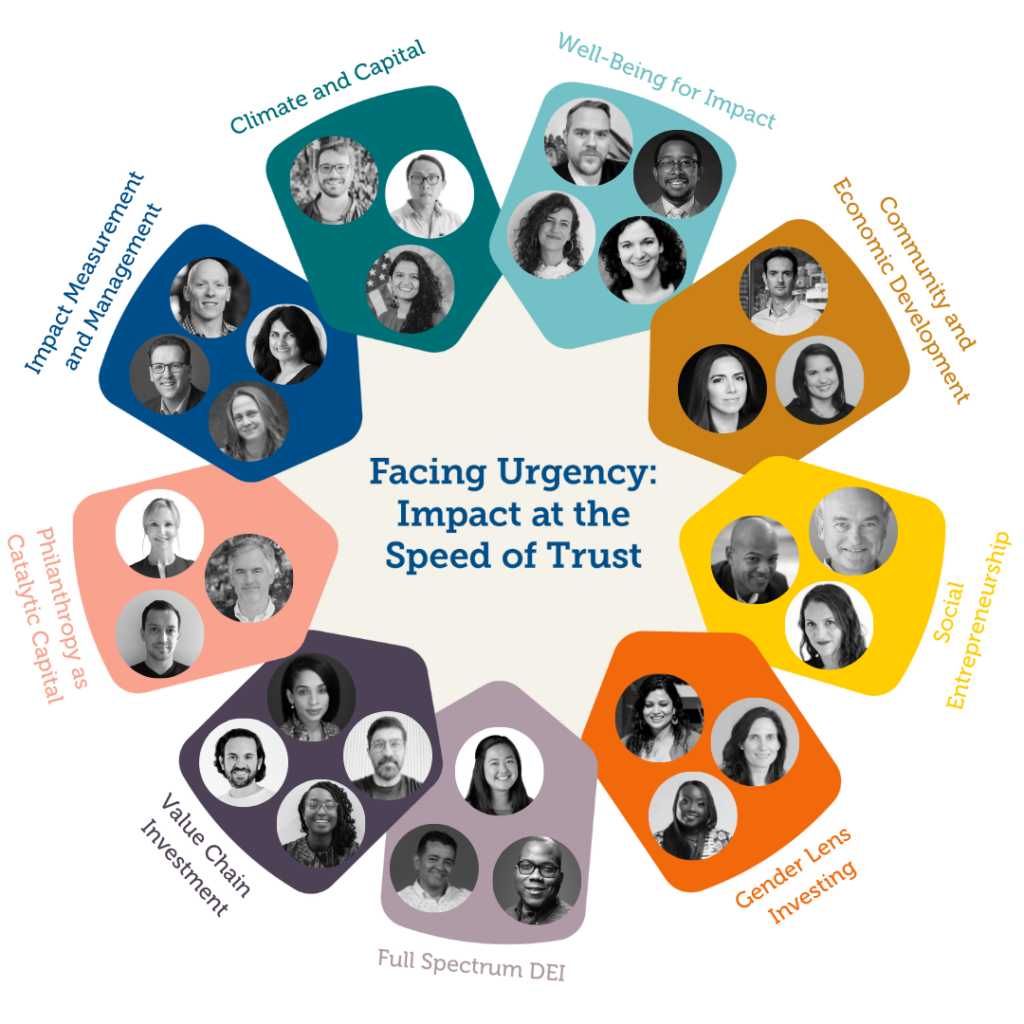
Introducing the Inaugural SOCAP Content Curation Councils
We are proud to introduce the current members of the inaugural SOCAP Content Curation Councils. We are finalizing the members as we complete each track-specific council — stay tuned for updates!
Full Spectrum DEI
- Ruben Hernandez, Full Spectrum Capital Partners
- Joanna Kuang, Illumen Capital
- Jimmie Briggs, Skoll Foundation
Value Chain Investment
- Ndidi Okonkwo Nwuneli, Sahel Consulting Agriculture & Nutrition Ltd.
- Antonio Nuño, Someone Somewhere
- Sylvia Dimiti, Prosper Africa
- Rick Kellett, Value Chain Investor
Philanthropy as Catalytic Capital
- Alejandro Alvarez von Gustedt, Rockefeller Philanthropy Advisors
- Joe Collins, The Philanthropy Workshop
- Alicia Maitland, Convergence Blended Finance
Impact Measurement and Management
- Dipti Pratt, Toniic
- Antony Bugg-Levine, Lafayette Square
- Sasha Dichter, 60 Decibels
- Astrid Scholz, Armillaria
Climate and Capital
- Tom Chi, At One Ventures
- Daniel Contrucci, Climate Ventures
- Aparna Shrivastava, U.S. International Development Finance Corporation
Well-Being for Impact
- Joshua Haynes, Masawa
- Dana Preston, The Wellbeing Project
- Edwin Macharia, Dalberg Advisors
- Missy Rentz, The Wellbeing Project
Community and Economic Development
- Nathalie Molina Niño, KNOWN Holdings
- Santiago Alvarez, ALIVE Ventures
- Payal Dalal, Mastercard
Social Entrepreneurship
- Morgan Simon, Candide Group
- John Kohler, Miller Center for Social Entrepreneurship
- Jacques-Philippe Piverger, GoodLight Capital
Gender Lens Investing
- Agostina Pechi, Goldman Sachs
- Sana Kapadia, 2X Global
- Andia Laura Chakava, Graça Machel Trust
Asia
- Naina Subberwal Batra, AVPN
- Shariha Khanam Khalid, Impact Hub KL
- Celeste Tan, IIX Institute
Africa
- Frank Aswani, Africa Venture Philanthropy Alliance (AVPA)
- Almaz Negash, African Diaspora Network
- Anna Ekeledo, AfriLabs
Latin America
- Carolina Suarez, Latimpacto
- Yuri Soares, IDB Lab
- Rodrigo Villar, New Ventures Mexico
SOCAP23 Content Selection Process
The content team and Content Curation Councils are taking into consideration feedback from previous attendees and speakers to influence content for this year’s conference. Particular topics, trends, and developments that were well-received in the past — that left the audience yearning for more— are given serious consideration to be included in this year’s event. Successes and lessons learned from past SOCAP events serve as valuable sources of feedback and inspiration for the content team.
We remain committed to including and prioritizing SOCAP community-driven content, primarily sourced through the SOCAP Open process, because it has proven to be inclusive, engaging, and relevant to our audience. SOCAP Open not only helps us crowdsource content, but it also allows us to take stock of what matters to our audience now. We received nearly 500 submissions in this year’s SOCAP Open! We are thrilled with the participation and wish we could include everyone’s innovative ideas. We remain committed to having at least one-third of the sessions at SOCAP derived from the Open process. By drawing on the experiences and knowledge of community members, the content and context are grounded in real-world examples and offer actionable insights that attendees can apply in their own work and lives.
